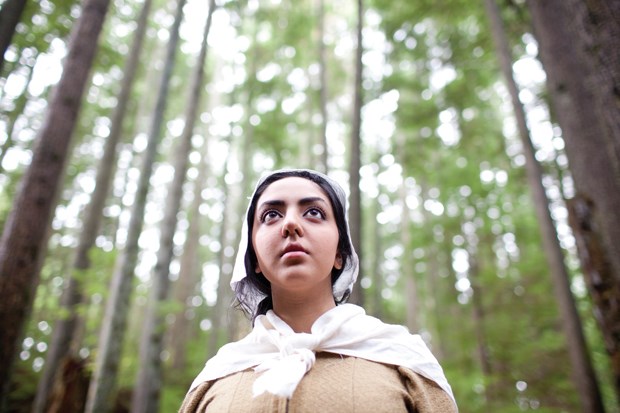The Crucible, Nov. 26-28 at the Darlene S. Howard Theatre, Collingwood School (Morven Campus), 70 Morven Dr., West Vancouver. Call 604-925-3331 for tickets.
For stage performers, a black box theatre provides all the creative freedom of a blank canvas.
Bound only by four walls, directors, actors and stage technicians are able to, somewhat ironically, think outside the box when producing a show. And that's just what the drama students at West Vancouver's Collingwood School have been doing for the last few weeks as they prepare to stage Arthur Miller's 1953 play The Crucible in their school's brand new black box - the Darlene S. Howard Theatre.
"There's no structure in the room, there's no architecture, there's no proscenium arch. There's just a big empty space and we can put the seats wherever we want," explains Collingwood drama teacher Michael Wener, who is directing the production. "It's a very exciting opportunity to stage the play. We are going to depict all of the scenes through lighting and it's going to look fantastic."
Constructed as part of Collingwood's Morven Campus renovation and expansion, the new theatre space measures 50-by-60 feet and features a wire grid 16 feet above the floor where lighting, sound and special effects technicians can work their magic.
The Crucible is a dramatization of the infamous Salem witch trials, which took place in Puritan New England in 1692, though the play is often interpreted as an analogy of McCarthyism and the anti-communist sentiment of the 1950s. Originally a 3.5-hour show, Wener has condensed Collingwood's production down to a more manageable hour and a half.
The large cast comprises students in grades 8 to 12 who will "play in the round" with 108 seats surrounding a central performance space. This experience will be a first for many of the young actors.
"For the most part, the kids have no idea how great a feeling it is to be playing in the round, to be surrounded by your audience. It's a much more natural way to play theatre. It doesn't have that artificiality of proscenium where you're always facing forward," says Wener, an actor, director and producer himself.
The black box works particularly well for The Crucible, he says, because of the play's many quick transitions.
"There's lots of scenes. In the first act, there's about 50 different short scenes."
A minimalist set allows the players to cut from scene to scene rapidly without having to move cumbersome furniture or open and close a curtain.
The new theatre space is named after Darlene Howard, a major patron of the school with her husband Paul.
"I give time, talent and treasure where my passions lie and my passions actually lie in education and the arts and my community. I identified that a long time ago," says Howard, whose sons graduated from Collingwood in 2000 and 2002.
She sat on Collingwood's board of governors for nine years, is a former board member and chair with the Vancouver Playhouse and a current board member with Bard on the Beach. Last year, the stage in the Douglas Campbell Theatre tent at Bard on the Beach was named the Howard Family Stage in honour of the Howard's continued support.
"I really believe the arts are mind-expanding, experience-expanding — they teach tolerance, they teach discipline, they teach understanding of other cultures," Howard says.
Her namesake theatre is the perfect size, as far as Wener is concerned. Any performance space that accommodates more than 120 seats places the audience too far away from the action, he says.
"Any large theatre where you're sitting in a balcony or you're sitting in the last row, the actors, they're five miles away. You just don't get that great experience of being right there," he says.
As a drama instructor, his hope is that students who walk into the space for the first time get the sense that "theatre can be anything."
"We have everything we need to do anything we need," he says.



